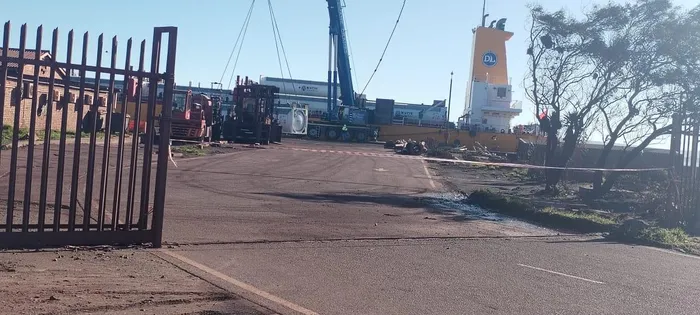Concerns raised over safety protocols at Saldanha Bay Port following docking of vessel

Questions were raised about the recent docking of the Forest 6 cargo vessel at the Saldanha Bay Port recently.
Image: Supplied
Allegations have surfaced from Transnet Port Terminals (TPT) insiders and other officials regarding the recent docking of the vessel Forest 6 at Saldanha Bay Port, which has allegedly offloaded 48 isotainers without adhering to essential safety protocols.
The incident has prompted a deeper investigation into compliance with the National Occupational Health and Safety Act by both TPT and the Transnet National Ports Authority (TNPA), raising concerns about the safety measures in place to protect workers and the environment at the port.
According to information from some officials on the ground, who asked not to be named for fearing reprisals, the Forest 6 vessel docked at Jetty 406 and began offloading approximately 1728 tonnes of liquefied petroleum gas (LPG) despite stringent objections from local safety authorities at Transnet Port Terminals (TPT).
"On June 10 at 14:50, officials at TPT expressed grave concerns regarding the risks associated with the offloading process. Citing safety grounds, they rejected the vessel’s offloading request, citing the unusual weight and the use of a crane that is not standard for the terminal environment."
However, while this was going on, an unnamed official from "head office" intervened, overruling the local TPT safety objections and insisted that the operation continue.
According to TPT in response to detailed questions, the Forest 6 docked at their terminal from June 10 until June 12, 2025 under a standing terminal operating license, allowing them to handle such cargo.
They stated that all safety protocols, compliant with standard operating procedures at the terminal, were diligently followed throughout the operation.
However, they refrained from divulging any third-party information or documentation, citing the stipulations of the Protection of Personal Information Act (POPI Act).
Contrarily, the TNPA has asserted that no vessel has docked at Saldanha Bay without adhering to the strict tenets outlined in the National Ports Act and corresponding Port Rules and Berthing Guidelines.
Ayanda Shezi, the group head of corporate affairs at Transnet maintained that the Forest 6, which was granted ISPS (International Ship and Port Facility Security) clearance by the Department of Transport on 15 May 2025, was assigned to berth 201 after a comprehensive risk assessment according to established regulatory frameworks.
Furthermore, she confirmed that customs clearance was mandatory for all incoming cargo at South African ports, a process that is rigorously verified by the terminal operator.
"No vessel has docked in the Port of Saldanha without following the prescripts of the National Ports Act, Port Rules, and Berthing Guidelines. TNPA is not aware of vessel/ terminal operations that are inviolation of the National Occupational Health and Safety Act or any applicable safety protocols.
"The Vessel “Forest 6” was ISPS (security) cleared on May 15, 2025 by the Department of Transport and docked by TNPA Marine Services at Berth 201 on June 10.
"TNPA assigned the vessel Forest 6 to berth 201 based on a comprehensive risk assessment, in line with the National Ports Act and Port Rules. No imported cargo is allowed to land in a South African port without customs clearance, such clearance is verified by the Terminal Operator.
"Lastly, TNPA is not required to notify the South African Reserve Bank regarding products in the cargo carried by vessels," she explained.
Bongani Philips, the CEO and Chairman of LIU Energy, which was one of the companies responsible for bringing in and importing the Liquefied Petroleum Gas in isotaners on board vessel Forest 6 at Saldanha Bay, denied allegations of violations of safety protocols in bringing in the products.
He raised urgent concerns regarding the treatment of black-owned companies in South Africa’s energy sector, particularly in the importation of LPG.
Phillips expressed frustration at the refusal to grant important licenses that would allow them to operate efficiently.
He noted that the same cargo that faced scrutiny in South Africa was routinely imported into Namibia without issue, raising questions of selective enforcement and potential discrimination.
“LPG in ISO containers is not more dangerous than the bombs and bullets imported for military defence in this province.
"I will not allow certain individuals to dictate terms to me when I have the rights to bring cargo into South Africa,” he said.
DAILY NEWS